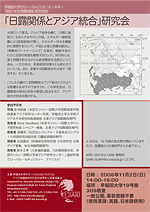Politics and Security Field
Research:Seminars/Workshops
"Seminar: Russian-Japanese Relations and Asian Integration"
2008.11.02
Waseda University Global COE: GIARI "Politics-Security" Section Presents: "Seminar: Russian-Japanese Relations and Asian Integration"
Room 309, Bldg. 19, Waseda University
Open to the Public; no prior registration required; conducted in English and Japanese
* Please note that the main entrance to Bldg. 19 will be closed. Please use the entrance facing the Waseda University Library.
Poster:
Waseda University Global COE: GIARI "Politics-Security" Section Presents:
"Seminar: Russian-Japanese Relations and Asian Integration"[851KB]

Introduction
Great Power Russia Resurrected. The Georgian conflict has prompted talk about the "Return to the Cold War." Russia, with its much-boosted national budget thanks to the higher energy prices on the global market, is actively undertaking energy diplomacy. Russia has resolved its territorial dispute and is advancing its "strategic partnership" with China. Moscow is also looking for a role in future prospects on the Korean Peninsula. Vis-a-vis Japan, despite the unresolved bilateral territorial dispute, Russia is activating its economic ties with Japan. On the other hand, Japan's slow economic recovery is about to end and it appears "adrift" in the fast-changing ocean of international politics.
How will these relations between Russia and Japan affect Asian integration? This seminar discussed the possibilities of Asian integration through a focused examination of the current state of Russian-Japanese relations and their future prospects.
The presenters agreed that the post-Cold War Russia sees the benefits of closer ties with Asia and this enhances Japan's importance in Russia's strategic calculus in the region. The presentations and discussion at the seminar suggest that Russia's role in Northeast Asia will grow in the near future as the Putin-Medvedev team's pragmatism points to improved relations with Russia's neighbors, particularly China and Japan. Moreover, Moscow sees the country's energy resources not only in economic terms, as an important source of revenue, but also in strategic terms, as a source of political influence in the region. Whether Moscow will succeed in its economic and strategic aims in the region will depend on the global price of energy, particularly oil and natural gas, and Russia's bilateral relations with China, Japan, and the United States. With respect to Russia's relations with Japan, one of the presenters observed that Moscow's pragmatism has improved the chances of a solution to the territorial dispute over the Northern Territories (southern Kuriles). Another presenter noted the limitations to Russia's strategic partnership with China and Russia's need to improve relations with Japan. Yet another presenter maintained that Japan's approach toward Russia would continue to depend critically on Japan's alliance with the United States. The seminar concluded that we need to watch these possibilities closely.
Participants and Resume
Tsuneo Akaha (Professor of International Policy Studies and Director of the Center for East Asian Studies, Monterey Institute of International Studies, U.S.A.; Visiting Professor, Graduate School of Asia-Pacific Studies, Waseda University; expert on international relations in Northeast Asia)
Introduction / Tsuneo Akaha [7KB]
Presenter:
Anna Vassilieva (Professor and Head of the Russian Studies Program, Monterey Institute of International Studies, U.S.A.; expert on Siberia and the Russian Far East, international relations in Northeast Asia)
Post-Soviet Chaos, Modernization, and Pragmatism in Russian Foreign Policy: Implications for Russian-Japanese Relations / Anna Vassilieva [4KB]
Presenter:
Hiroshi Takahashi (Deputy Director, Institute of Russia-NIS Economies, Russia-NIS Trade Association; expert on Russian-Japanese economic relations)
Major Changes in Russian-Japanese Trade and Investment Relations / Hiroshi Takahashi [4KB]
Presenter:
Shinji Hyodo (Chief Researcher, National Institute for Defense Studies; expert on military and security affairs in Northeast Asia)
The Direction of Japan-Russia Relations and Impact on the Security Aspect of Asian Integration / Shinji Hyodo [4KB]
Presenter:
Masataka Suzuki (Former Member of the House of Councilors; Former State Secretary for Defense; Senior Research Associate, Center for East Asian Studies, Monterey Institute of International Studies, U.S.A.; global security analyst)
Russian-Japanese Security Relations: A Call for Human Contacts / Masataka Suzuki [4KB]
